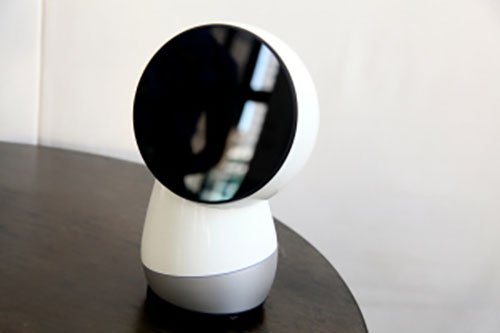This is an interesting thing to think about: let’s say ‘The Internet of Things’ may be fully normative by 2030 or so. That means your house is all connected, and you can update everything via a smartphone, etc. People have been rushing into this space for a few years now. While that’s cool — who doesn’t want to control their thermostat from 1,000 miles away via an app, right? — there’s this psychological aspect whereby the human emotion / social connection component could kind of fall by the wayside.
Maybe not: now there’s a robot called Jibo, by a Cambridge company of the same name. (Massachusetts, that is; not England.) It’s designed to be “warm” and “part of the group” and almost “a part of the family.” (It’s almost as cute as this guy.) Here’s a brief contextual explainer on how Jibo works:
During a demonstration, Breazeal held a short conversation with Jibo.
“Jibo, how are you doing?” she asked.
“I’m great, thanks for asking,” Jibo replied.
Jibo then launched into an explanation of its skills: relaying notifications, acting as a telepresence screen, dramatically reading a book. The startup would like to see developers pair Jibo with connected devices. A Nest thermostat would still do its job of tracking your patterns and adjusting your home’s heating and cooling, but Jibo would act as its face. Instead of programming the thermostat through your phone, you would just ask Jibo to take care of it.
Alright, so this brings up a whole host of additional questions.
1. Do we want our robotic assistants to have a human-type social connectivity with us, or is that freaky?
2. If we can get to a technological point where robots have the capacity for social-emotive context, would that fundamentally challenge the question of what it means to be human?
3. Could things like Jibo replace the need to get a pet in the future?
4. Could Jibo make it more realistic to live far apart from your family, even as oil / airline prices rise? Consider this:
In the video, Jibo interacts at a dinner table like it’s one of the guests, switching between displaying the face of a distant family member communicating via a telepresence app (which will let you tap faces on it and make Jibo turn its head toward them) and automatically swiveling to pay attention to someone else speaking nearby it. It moves, in other words, as one might expect a living thing to.
There’s a ton always being made of what happens when robots take our jobs, or hunt us down and kill us like dogs, or whatever else. But what if they can become part of our family in some odd way? Is that a good thing or a bad thing?
